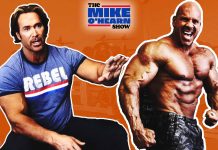The positives and negatives of muscle dysmorphia.
Bigorexia. At some point during a bodybuilder’s journey they are likely to come across the word. While there may be no definitive definition of the word, it’s essentially body dysmorphia. To be more exact, it’s the notion that a bodybuilder can never be big enough, constantly striving for more muscle.
To some extent, every high level bodybuilder suffers from bigorexia. In a way they really have no choice. If you’re a competitive bodybuilder looking to be Mr. Olympia, then the reality is you’ll have to gain enough muscle to get to the threshold. The thing is building all that massive muscle doesn’t guarantee you a win. There are simply so many other factors that determine whether a bodybuilder can become a champion or not.
Bigorexia can certainly be a positive thing for many people. In a recent GQ Magazine article there were certain bodybuilders who embraced the disorder.
As one bodybuilder put it, “The idea that one day I might walk through a crowded public space and, because of my body, attract revulsion is exciting to me.”
Another bodybuilder credited bigorexia or muscle dysmphoria as a method of keeping away from more “dangerous” addictions.
“I’m happy with my muscle dysmorphia. At least it never turned into a drug or alcohol addiction”
That may be intense, but it’s their truth. Bigorexia can push a bodybuilder to achieve things they otherwise wouldn’t have. It provides them with the drive, the fuel to keep pushing forward to build on their physique. From a competitive perspective it’s an asset.
But what about those who aren’t competitive? Where does that leave them? An even bigger question is where does that leave a bodybuilder when they’re unable to train at the gym?

The current climate is showing the drawbacks of suffering from this disorder. To have bigorexia and be unable to satisfy your urge for training can be truly detrimental to a lifter’s mental state.
We have to question if someone suffering from muscle dysmorphia can’t train will their disorder lead to more dangerous outlets?
In reality that is entirely a person to person issue. It’s possible for someone to suffer from bigorexia yet have interests outside of chasing muscle that allows them to cope through this time. There are no doubt others who suffer from the disorder that view training as the only thing important in their lives. The latter is a more upsetting case considering that the current state of the world is leading to rising cases of depression. Suicides are on the rise and many are finding it hard to deal with isolation. With the loss of one of their biggest outlets, training at the gym, the lifter with bigorexia could be faced with some truly harrowing circumstances.
With all that said, serious athletes of any discipline have learned how to build resiliency. These times can be viewed as a time to reset the body and mind. For some it may give them the chance to recover both physically and mentally if they’ve been pushing themselves too hard.
This time of separation can be an opportunity for continued internal growth. The quarantine can be viewed as a prison sentence keeping people away from the things they love. It can also be a time of self reflection that will allow us to come out stronger when the world opens back up.
While there are no exact guarantees on isolation being a positive or a negative, we can certainly sit back and rationalize the fact that emotional agility is the most important factor of coming out of this quarantine with a clear and strong mind. A lifter with bigorexia shouldn’t worry so much about the muscle they dread to lose, but the mental fortitude they hope to gain by surviving this complicated time.
Generation Iron will be exploring these themes in an upcoming documentary that looks to tackle the issue of Bigorexia head on.
For more news and updates, follow Generation Iron on Facebook, Twitter, and Instagram.
Managing Editor at Generation Iron, Jonathan Salmon is a writer, martial arts instructor, and geek culture enthusiast. Check out his YouTube, Instagram, Twitter, Facebook, and Sound Cloud for in-depth MMA analysis.















